Banner campaign
Latest
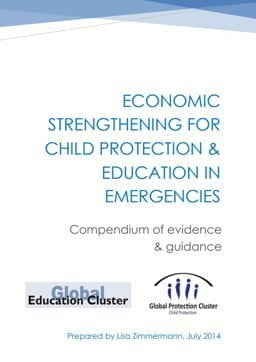
Economic Strengthening for Child Protection & Education in Emergencies
Guidelines and Tools
The aim of this compendium is to provide education and child protection coordinators and partners working in the field who are involved in or confronted with economic strengthening programmes with key existing evidence and guidance documents in order to inform their work, at all stages of a programme...
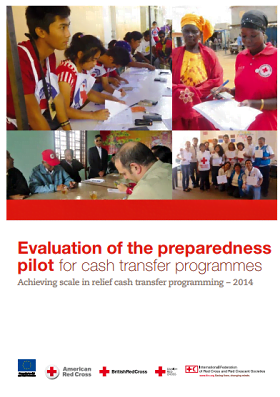
Evaluation of the Preparedness Pilot for Cash Transfer Programmes – Achieving scale in relief cash transfer programming – 2014
Report
It is recognized that cash transfer programming can be effective in supporting populations affected by disasters in a way that maintains dignity and choice for beneficiaries while stimulating local livelihoods, economies and markets. However, the majority of cash transfer programming has been undertaken...
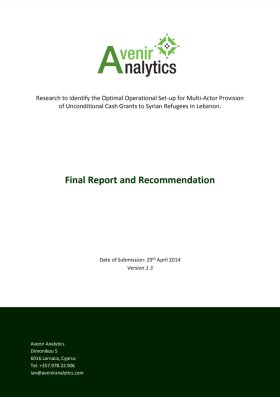
Research to Identify the Optimal Operational Set-up for Multi-Actor Provision of Unconditional Cash Grants to Syrian Refugees in Lebanon: Final report and recommendation
Report
This report contains the findings and recommendations from a 30 day research project commissioned by the cash working group (CWG) based in Lebanon, and more specifically the team tasked with the operational set-up. The Avenir research project team was engaged to identify the optimal operational set-up for...
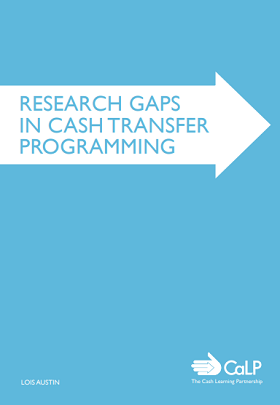
Research gaps in cash transfer programming
Report
Gathering evidence through action research is one of the ways that the CALP Network aims to improve cash transfer programming (CTP) implementation and raise awareness about CTP and its use as an appropriate and effective mechanism for emergency response. Before defining potential research topics for 2014,...

Understanding the Interaction Between Women’s Economic Empowerment and Gender Based Violence: Study on ACF’s cash transfer programme in northern Uganda
Report
This paper presents findings of a qualitative study conducted in Northern Uganda, on the effects of a cash transfer programme on gender relations and GBV in a post – conflict context. The intervention in focus is Action Against Hunger |ACF International (ACF)’s ‘Combating Gender Based Violence and...
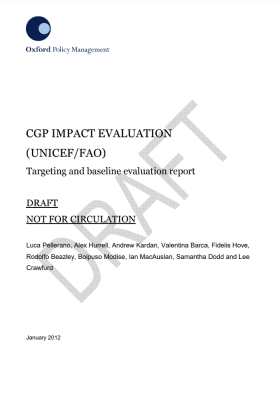
CGP Impact Evaluation (UNICEF/FAO): Targeting and baseline evaluation report
Report
The Child Grants Programme (CGP) is an unconditional cash transfer targeted to poor and vulnerable households in Lesotho. The primary objective of the CGP is to improve the living standards of Orphans and Vulnerable Children (OVC) so as to reduce malnutrition, improve health status, and increase school...
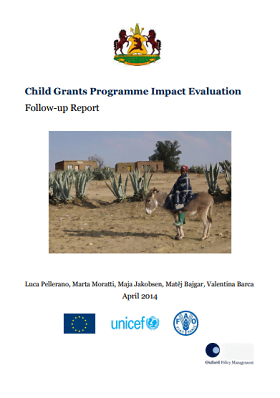
Child Grants Programme Impact Evaluation Follow-up Report
Report
The Lesotho Child Grants Programme (CGP) is an unconditional social cash transfer targeted to poor and vulnerable households. It provides every quarter a regular transfer of between M360 and M7501 to poor households with children that are selected through a combination of Proxy Means Testing (PMT) and...
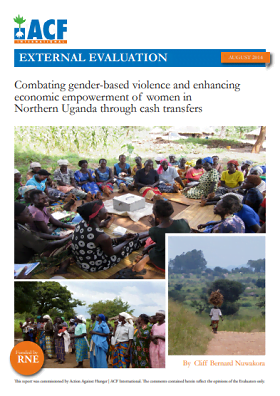
Combating gender-based violence and enhancing economic empowerment of women in Northern Uganda through cash transfers
Report
The aim of this evaluation is to assess the relevance, sustainability, effectiveness and efficiency of the programme. Moreover, the evaluation will assess the impact of the programme on women and girls in relation to livelihoods and economic empowerment and access to social services, including education,...

Evidence of impact of emergency cash transfers on gender and protection
Report
This rapid review gathers together reports which provide evidence on the gendered and protection impacts of cash transfers (CTs) in emergency and humanitarian contexts. It aims to provide a guide to the level and type of evidence which is available, as much of the work written on this topic relies on...

Effects of the Palestinian National Cash Transfer Programme on Children and Adolescents
Report
Over the past two decades, social protection programmes have been implemented in many developing countries to reduce poverty and vulnerabilities in the face of context-specific challenges such as economic crises,inequality and exclusion, and human development deficits. The multidimensional...
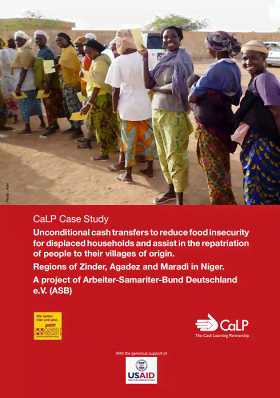
The CALP Network case study – Unconditional cash transfers to reduce food insecurity for displaced households and assist in the repatriation of people to their villages of origin – Niger
Report
In 2012, Niger was affected by a food crisis that caused large population displacements. The NGO Arbeiter- Samariter-Bund Deutschland e.V. (ASB) distributed unconditional cash transfers in areas of food insecurity to improve food access for those displaced and those affected, and to help repatriate...
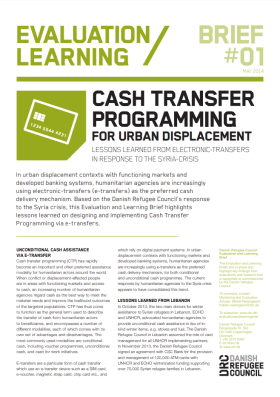
Cash Transfer Programming for Urban Displacement
Policy paper
In urban displacement contexts with functioning markets and developed banking systems, humanitarian agencies are increasingly using electronic-transfers (e-transfers) as the preferred cash delivery mechanism. Based on the Danish Refugee Council’s response to the Syria crisis, this Evaluation and...
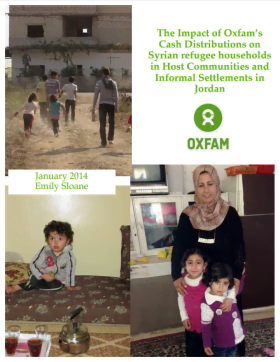
The Impact of Oxfam’s Cash Distributions on Syrian Refugee Households in Host Communities and Informal Settlements in Jordan
Report
Given the absence of viable alternatives to cash transfer programmes (CTPs) in Jordan, such programmes will certainly continue for the foreseeable future. It is crucial to review their impact to date in order to identify common issues and lessons learned and adjust programmes accordingly. The present...

Is Cash Transfer Programming ‘Fit for the Future’? – Executive Summary
Report
This summary presents the results of a 2013 research study entitled, Is Cash Transfer Programming ‘Fit for the Future’? The research was commissioned by the the CALP Network and undertaken by the Humanitarian Futures Programme (HFP), King’s College London. The project intends to understand...

Cash-Based Assistance Programmes for Internally Displaced Persons in the Kabul Informal Settlements
Report
To improve aid delivery and effectiveness, Welthungerhilfe (WHH) piloted during the 2013/2014 winter a mobile-based cash assistance programme aimed at supporting IDP families living in the Kabul informal settlements (KIS) using Roshan’s M-PAISA service. To assess the strengths and...

Sector Indicator Guidance for Programming
Guidelines and Tools
The country Programming Instructions that were sent to EU Delegations and HQ services in mid-May 2012 for the programming period 2014-2020, requested the EU Delegations and services to provide, in the second phase of the programming process, a description of specific objectives for proposed priority...
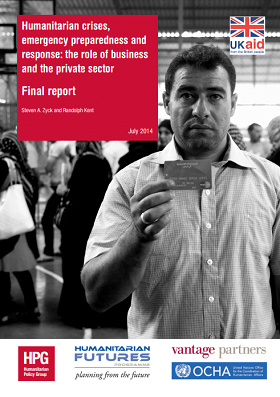
Humanitarian crises, emergency preparedness and response: The roles of business and the private sector – final report and case studies from Indonesia, Kenya, Jordan and Haiti
Report
The private sector has long been a major contributor to humanitarian action. At the community level, businesses frequently use their materials and resources to aid people affected by crises. As local markets recover and supply chains are repaired, crisis-affected people are once again able to access basic...
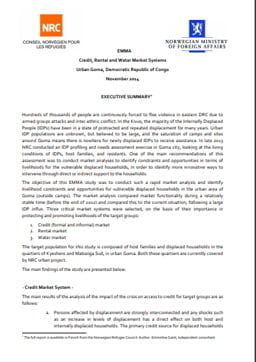
NRC – EMMA on Credit, Rental and Water Market Systems, Urban Goma, DRC, Nov 2014 – Executive Summary
Report
Hundreds of thousands of people are continuously forced to flee violence in eastern DRC due to armed groups attacks and inter-ethnic conflict. In the Kivus, the majority of the Internally Displaced People (IDPs) have been in a state of protracted and repeated displacement for many years. Urban IDP...

Social Transfers in the Fight against Hunger – A resource for development practitioners
Report
A European Commission Reference Document aims to deepen the understanding of a concept, develop knowledge, provide orientations for aid implementation, and present good practices. This Reference Document is intended as a resource to support the practical integration of social transfers into programmes...

Is Cash Transfer Programming ‘Fit for the Future’? – Final Report
Report
This report presents the results of a 2013 research study entitled, Is Cash Transfer Programming ‘Fit for the Future’? The research was commissioned by the the CALP Network and undertaken by the Humanitarian Futures Programme (HFP), King’s College London. The project intends to understand...